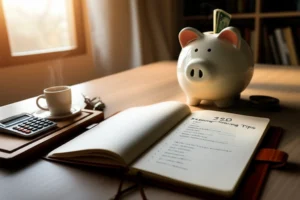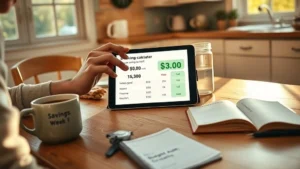If you’re looking for a sign to get your finances under control, let’s be real—it’s this one. The truth is, you don’t need a finance degree or a spreadsheet obsession to start seeing big changes. You just need a plan that actually fits your life. Let’s talk about better money habits budgeting: the real path to more freedom, less stress, and (yep) a future you actually feel good about. And I promise, this isn’t about giving up every little treat or selling your soul to a budget tracker.
So, you want to spend smarter, save more, and maybe finally shake that weird stomach-dropping feeling when you peek at your bank app? You’re in the right place. If you stick with me for a few minutes, you’ll walk away with step-by-step actions—no dry lectures, just things that work for real, messy lives.
Budgeting Demystified
Honestly, “budgeting” gets a bad rap. It’s not about spreadsheets you never look at or denying yourself absolutely everything that brings you joy. Here’s what better money habits budgeting really means: it’s a game plan where every dollar has a purpose, and you’re driving—not your bills, not your stress. Think of it like GPS for your money. Instead of wandering, hoping you eventually end up where you want, now you can actually map the route.
There are a few basic ingredients: a budget you actually use, some way to keep track of spending, regular check-ins (yes, like a money diary), and strategies for saving up—even if it feels impossible right now. Bonus points if you know your habits and triggers (late-night scrolling? Takeout for the third night?). Your starting point is understanding—what’s coming in, what’s going out, and what you care about most (Emergencies? Debt? That secret dream trip?).
Why Bother? Balancing The Good and The Tough
Let’s get real—better money habits can be both a lifesaver and a little annoying. Let’s lay out both sides:
- The Upside: A budget offers real-life superpowers: less second-guessing at checkout, more to stash away for emergencies or goals, and—maybe most importantly—a sense of calm instead of that familiar “oh crap” feeling when a bill pops up unexpectedly.
- The Trade-offs: Sticking to a plan can be tough at first. It takes time to get honest with yourself (and sometimes your spending is… let’s say, “creative”). Sometimes you hit a wall or want to throw the whole thing out the window.
But here’s the secret—better money habits budgeting isn’t about perfection, it’s about progress. Even small wins (like tracking every coffee or transferring $10 to savings) add up way faster than you think.
Start Small: Your First Month Plan
Still with me? Awesome. Let’s build your foundation—a no-fluff, four-week checklist. Even if you’ve failed budgets before or never really tried, I promise: These steps work. Pick one thing to focus on each week and see what clicks.
Week 1: Know Your Numbers
- Add up every source of income (paycheck, side gigs, random birthday gifts—get it all down).
- List your monthly essentials: rent, bills, groceries, transportation, debts.
- Now, grab your last month’s spending—grab a bank statement, scroll your app, or dig through receipts—and track where the rest went.
Don’t judge—just notice. Sometimes just seeing the numbers sparks a lightbulb (“I spent more on late-night delivery than on groceries?!”) That’s empowering, not shaming.
Week 2: Pick Your Budgeting Style
There’s no “one perfect” way—choose a method that fits you, not the other way around. Here’s a quick peek:
| Method | How It Works | Best For |
|---|---|---|
| 50/30/20 Rule | Half to needs, 30% to wants, 20% to savings/debt. | Simplicity, balance. |
| Zero-Based | Every dollar gets a job—income minus expenses = zero. | Full control (and detail lovers!) |
| Envelope/Cash | Divide cash into envelopes by category—spend only what’s in each. | Impulse control, “see and feel” budgeters. |
| Pay-Yourself First | Savings comes out immediately, spend what’s left. | Building savings habits, automation fans. |
Pick one—don’t overthink it. You’re aiming for better, not textbook perfect.
Week 3: Track and Tweak
- Log your daily spending—app, notebook, whatever you’ll actually use. Don’t skip the small stuff (that’s where sneaky leaks hide).
- Check in once a week. Which category is eating your cash? What could you pause or cut back, just for a few weeks?
- If you mess up, keep going. This part’s about noticing patterns, not feeling bad.
Week 4: Automate and Simplify
- Set up auto-savings—even $10 a week builds momentum.
- Automate bill pays when possible (less chance for late fees or stress).
- Use alerts or calendar reminders for bills, transfers, or those “uh-oh” spending triggers. Future You will say thank you.
Deep Dive: Find Your Perfect Budget System
Let’s break down those big four budgeting methods, so you can pick (or bend) the one that suits you best.
50/30/20 Rule
This classic gets a lot of love because it’s flexible. Say you bring home $3,000 a month. You’d spend $1,500 on needs (rent, food, utilities), $900 for wants (fun, travel, non-essentials), and sock away $600 to savings or paying off debts. But honestly? If your needs are more than 50% (hello, rising rent), don’t stress—the point is to get closer to balance over time.
Zero-Based Budgeting
Think of this like making every dollar pull its weight. You plan out your income minus all your expenses—if you’re left with “zero,” you know where everything went. This one’s great for detail-lovers or anyone with shifting income (freelancers, students, anyone living in the “gig life”).
Envelope/Cash Method
Old-school and oddly fun: you put actual cash into envelopes for each spending category—when one’s empty, spending’s done till next month. You can also do this digitally with apps. So if you constantly overspend on eating out, try this for a month. Sometimes seeing the empty envelope hits different than a declined debit card, right?
Pay Yourself First
Here’s the empowering part: move savings to the top of your priority list. Automatically transfer a chunk of EVERY paycheck to your savings or investment account the day you’re paid. Spend what’s left. It takes willpower out of the equation, and suddenly, you have an emergency fund without having to sweat the details.
Making Habits Stick (Even When Life Gets Messy)
I’ll be honest—changing money habits isn’t a straight-line journey. Sometimes you’ll hit a week where everything goes wrong (lost wallet? impulse Amazon buy?), and that’s just part of real life. Here are a few ways to nudge yourself back on track:
- If-then plans: “If I want to buy coffee, I’ll check my ‘fun’ budget first”—little rules make decisions less emotional.
- Visualization: Picture future-you—calm, confident, maybe on that trip, or just able to cover a surprise bill without panic. Give your budget a real-life goal to anchor on.
- 15-minute check-ins: Set a weekly “money date”—review your accounts, update your budget, forgive yourself for mistakes, tweak the plan if needed. Maybe make it part of a Sunday routine, like laundry or prepping snacks.
Oh, and never underestimate the power of small wins—adding $10 to savings is still a win. Celebrate it. Share it. Then do it again.
Getting Ahead: Level Up Your Money Game
Once your basic budget feels less like quicksand and more like solid ground, you can step it up:
- Build an emergency fund—aim for one month of expenses to start (baby steps!), then three to six months if you’re able. Call it your “cushion” or “oh-no” fund.
- Attack debt—use either the “snowball” (pay smallest debt first, build momentum) or “avalanche” (target highest interest). Tools and calculators are everywhere—seriously, just try one.
- Dip a toe into investing—after your basics are covered, consider setting up a beginner retirement account or low-fee index fund. You don’t need much to start, and your future self will be SO happy with those early seeds growing quietly in the background.
And remember: even small steps taken early beat grand plans put off forever. “Better money now” isn’t just a catchy phrase—it actually works.
Stories From The Real World
Sometimes, nothing drives it home like true stories. Here’s one: My friend Alex started budgeting with the 50/30/20 rule, but her “wants” were really more like “needs” (frequent trips to see family, streaming to decompress after a long day). So, she didn’t quit those—she just scaled back, mixing in more dinners at home and skipping one trip a year. In six months, she finally saved her first $500 emergency fund—something she’d never managed before, even trying stricter budgets.
Or take Jamie and Pat, a couple juggling unpredictable freelance gigs and two always-ravenous kids. Their secret sauce? Weekly 15-minute budget meetings, a shared note app for expenses, and a separate “life happens” account—that’s it. No complicated budgets, just small tweaks and constant conversations. They didn’t get rich overnight, but the financial shouting matches basically vanished.
The point: budgeting isn’t about deprivation, it’s about control, sanity, and feeling less alone in your money. However you start, you can make it yours.
Use Trusted Resources (Because You Deserve Good Info)
Don’t go it alone—there are so many (genuinely useful!) free tools tailored for different stages of life. For super-clear guides, templates, and even better money habits video lessons, take a look at better money habits bank of america. It’s not just for banking customers—their interactive tools, real-life stories, and calculators can help you see your numbers in a whole new light.
Crunched for time, or feel more at home in an education setting? The better money habits khan academy lessons are excellent for straightforward, non-judgy walkthroughs (seriously, teachers rave about their better money habits high school lesson plans, too!).
Even Bank of America’s financial literacy game can make learning feel less like homework, more like fun—maybe even something you’ll want to share with family or bring to your own classroom or group (if you teach, coach, or parent). Having a community or resources at your fingertips makes the budgeting journey so much less lonely.
When And How To Adjust
Here’s the honest truth: life throws curveballs (unexpected bills, job shifts, surprise celebrations). If your budget feels off, don’t chalk it up to failure—review and adjust. Most people find a monthly review (or after a big life change) works best. If you ever feel lost, just go back to week 1—re-examine expenses and see what’s actually helping and what’s weighing you down. Progress isn’t always linear, but it’s always possible.
What Makes Budgeting “Better”?
Better money habits budgeting really comes down to small, doable changes, repeated over time. Track what matters. Spend mindfully (but allow for fun—life shouldn’t be all bills and beans!). Build in some slack for surprise expenses, keep learning, and be honest about what works for you (not for Instagram or anyone else).
If you’re nervous, that’s normal. Habits—especially money ones—are built on trust, time, and a dash of courage. The important thing is starting, trying, and learning as you go. You might even surprise yourself with how quickly little changes add up.
Wrapping It Up and Moving Forward
Let’s take a breath. You’ve made it through a ton—budget systems, habit hacks, honest stories, and trusted tools. The magic of better money habits budgeting isn’t about keeping every penny in line. It’s about finding clarity and control, so money works for you, not the other way around.
Start with just one change—maybe picking a budgeting style, or committing to a single 15-minute “money check-in” this week. Track your wins, learn from your slip-ups, and lean on trustworthy resources like those at better money habits bank of america and better money habits khan academy when you need a little support or inspiration. There’s no shame in starting small, and honestly, there’s power in asking questions—what do you hope to change first? Which method made you pause and think, “maybe that could work for me”?
Whatever your answer, remember this: every step you take—no matter how tiny—is a move toward a calmer, more confident money life. You’ve got this. And if you ever feel stuck, just come back, reread, reset, and keep going. Here’s to building habits that last, together.












